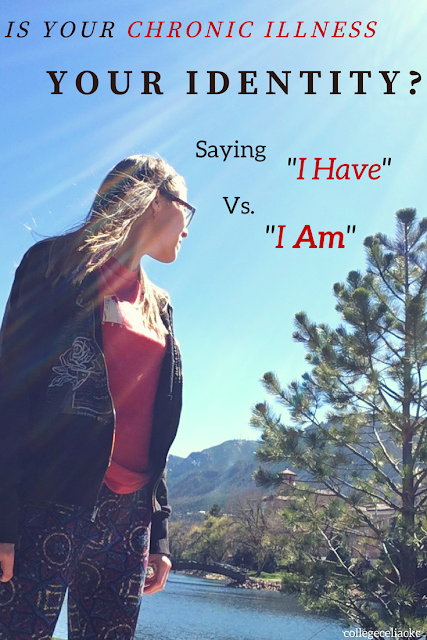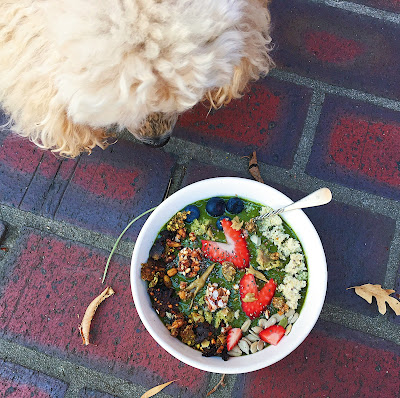Is Your Chronic Illness Your Identity? Saying "I Have Celiac" versus "I Am Celiac"
The more I connect with others in the chronic illness community, the more similarities and difference I notice. We all have different diagnoses - but we all know how it feels to have a doctor's visit that changes your life. Even with celiacs, we all eat gluten free - but our diets can still look radically different.
One of the most recent differences I've noticed in the gluten free community? Celiacs who say "I have celiac disease" versus "I am celiac."
Why does the distinction matter? Well, as a writing major who earned a (brutal) A in Linguistics, I obviously couldn't resist digging in.
When I say, "I have celiac disease," I'm talking about a trait. It's the same sentence structure as "I have gray eyes" or "I have an addiction to granola." (Both are true by the way).
Meanwhile, "I am celiac" says something slightly different. It says that celiac disease is who you are. It's an aspect of your very identity and roots, like "I am American."
I know some celiacs have argued against saying the latter - and, at first, I totally agreed. I am so much more than my celiac disease. I am so much more than any of my chronic illnesses.
At the same time, though, I can't deny that celiac disease has become a cornerstone of my identity. What feels like eons ago, I wrote a post about how "gluten free is my food culture" and, in a way, celiac is another culture that I now call my own.
There are various definitions of culture, but I think these two from the Merriam-Webster dictionary fit my purpose the best:
- The customary beliefs, social forms, and material traits of a racial, religious, or social group; also: the characteristic features of everyday existence shared by people in a time or place
- The set of shared attitudes, values, goals, and practices that characterizes an institution or organization
As a member of the celiac community, I agree with others that food can function as medicine. I share certain behaviors - like avoiding gluten in all forms, calling ahead to check restaurants' gluten free options, and obsessively reading food labels - with other celiacs as a direct result of my diagnosis. We probably even have certain values in common, like the importance of accurate food labeling or gluten free testing on "gluten free" products.
At first, I thought this would be a post about why to not say, "I am celiac (or any other chronic illness)." I thought it would be another uplifting article about how you are so much more than words in a hospital file - and that point is still true.
Yet, I think I'm also discovering another, less-covered facet of this issue: not identifying with your disease or chronic illness is freaking hard. With fibromyalgia, I live in varying degrees of pain 24/7. With celiac disease, I have to analyze and examine every piece of food that goes in my mouth - and many products that don't, like makeup or shampoo. How can I not be my disease when my life, one way or another, seems to always revolve around it?
I'm still learning the answer to that question. However, I think these two different statements - "I have" versus "I am" can act as a guide.
They remind us that we control just how much our disease is part of our identity. When I'm with my friends or a loved one, I'll probably say, "I have celiac" because, to them, I am not a medical diagnosis. I am a friend, a partner in crime, a daughter, a sister and countless other roles.
When I'm blogging, though, I don't mind being celiac if it can help someone accept their new diagnosis. I want to prove that you can raise awareness by identifying with your disease (and disproving stereotypes and myths about what a "celiac" really looks like. Fun fact: it's not always skinny, female or young!). Yet, you can still be empowered and multi-faceted.


My chronic illnesses are both traits and cornerstones of my identity - and I wouldn't change either. The challenges of celiac disease and fibromyalgia have fostered other traits I'm proud of - like strength, determination and the confidence to advocate for my own health. And identifying with both diagnoses has connected me with hundreds of amazing people all over the world.
So, yes. I have celiac. I am celiac. And whichever phrase you use to describe your chronic illness and yourself is A-OK.
Love this article? Click the following link to Tweet: Is your #chronicillness your identity? The difference in saying "I am" and "I have" a #disease. via @collegeceliackc http://bit.ly/2qh2GOY.
What phrase resonates with you? Do you see your health challenges as traits or parts of your identity? Tell me your thoughts below!






Fantastically aeticulated, couldn't agree more! I believe both statements are equally true :) In fact, sometimes I even go so far as to embrace my illnesses, for they are surely a fascinating part of me (okay I take that back. I'd take pain free any day ����)
ReplyDeleteI totally agree with the pain free part! ;) Thanks for your comment Sheryl!
DeleteI don't claim "I am" over my chronic illnesses because I am is the name of God. I have a gene mutation called Factor V Leiden, Neurocardiogenic Syncope and Fibromyalgia. Two of which I know I was born with because they have been proven to be genetic. I don't clam illness over my life. I speak health over my life. I try not to even use the term "battle." I don't want to be in a battle.
ReplyDeleteThanks for sharing your perspective, Brenda. It's one that I hadn't considered. And I LOVE your statement "I don't want to be in a battle." It's so important to remember that we can CHOOSE to not battle our own bodies.
DeleteBachelorsend.blogspot.com
ReplyDeleteHaving been through all that celiac entails, using your ability to connect with others via both identifying with the disease and as a person who has the disease is a wonderful way to let people know theyh aren't alone I coping with it. Thank you.
Thanks so much for your kind words. Have a fabulous rest of your week!
DeleteHi Casey,
ReplyDeleteThanks for commenting on my blog post this week about the traffic generation tips. I enjoyed seeing photos of your family. Congratulations on the graduate!
Janice
Thanks for the kind words, Janice! <3
DeleteSuch a great, empowering post!
ReplyDeleteThanks so much for the kind words, Rachel!
DeleteI think that one should use whichever terminology they are most comfortable with. It is not for me to judge.
ReplyDeleteAMEN! Love this perspective, Elise!
DeleteWow, that's very inspirational - thank you for sharing your own experience. I understand that everyone is gaining Freshman 15, I lost 20 lbs in the past 4 months, and the doctors have no idea what's going on and i'm just in and out of doctor offices trying to figure out. I basically gave up right now.
ReplyDeleteI'm sending so much love your way! I hope that you'l be able to find answers soon. The search for what's wrong is always the most frustrating part. <3 <3 <3
DeleteCasey your story is inspirational 😍
ReplyDeleteThanks so much for the kind words Ritu <3
DeleteCasey your story is inspirational 😍
ReplyDeleteA great post and I am left with the thought that it is up to the individual as to how they tell the world whtat they have or whom they are...Luckily I don't have that problem and for that I am thankful :) A good post :)
ReplyDeleteLove that perspective, Caz! To each their own!
DeleteI know your pain. I don't have celiac but I have lived with chronic illness and pain for years. Site to get my second op in 3 weeks. X
ReplyDeleteSending lots of love your way! <3
DeleteA trained medic can help you find the most health-friendly methods for this purposeThis means your preparedness has to differ depending on the method of detection, aka drug tests Pros Cons Quick Fix Synthetic urine is a pre-mixed specimen created in a lab, and one that is perceived to be clear, fresh, and realistically balanced in multiple characteristicspng 100w, https://wwwlaweekly A urine test involves providing fresh samples of urine for a lab to analyze
ReplyDelete